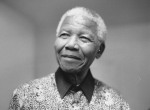Following the death of Nelson Mandela, Bloustein School professor Meredeth Turshen, D.Phil., spoke on his legacy and his link to the school at a Bloustein Faculty Council meeting. Her remarks are included here.
***********
 As we mourn the passing—and celebrate the life—of the great South African leader Nelson Mandela, jailed for 27 years for his opposition to white minority rule and a vicious system of racial separatism called “apartheid,” the EJB community may wish to recall the special relation between the anti-apartheid struggle, the Bloustein School and Rutgers University.
As we mourn the passing—and celebrate the life—of the great South African leader Nelson Mandela, jailed for 27 years for his opposition to white minority rule and a vicious system of racial separatism called “apartheid,” the EJB community may wish to recall the special relation between the anti-apartheid struggle, the Bloustein School and Rutgers University.
In 1985, Rutgers was one of the first public educational institutions in the United States to divest its endowment of companies doing business in South Africa. The divestment movement was led by students who staged a hunger strike and a sit-in at Rutgers Student Center on College Avenue, New Brunswick. A group of four—Professor Allen Howard (History), Professor Walton Johnson (Africana Studies), Ivy Matsepe (Casaburi), a South African doctoral student in sociology, and Professor Meredeth Turshen (Urban Studies)—mediated between students and the administration.
We not only gained divestment, but then-President Bloustein agreed to earmark $300,000 for such projects as bringing non-white South Africans to Rutgers for advanced training in subjects not open to them in their own country in preparation for the day when the majority would rule. President Bloustein also opened a grant competition to introduce international studies into the curriculum; Professors Salah El-Shakhs, Briavel Holcomb and Meredeth Turshen applied with success. The grant we won enabled us to begin a program of international studies at what later became the Bloustein School. Charlotte Bunch and Meredeth Turshen later launched the concentration in gender and international development.
Rutgers University can be proud of its participation in the divestment movement at a time when Congress labeled Mandela and the ANC terrorists and President Ronald Reagan was supporting the apartheid regime through the policy of “Constructive Engagement.”
For more details see http://nvdatabase.swarthmore.edu/content/rutgers-university-students-win-divestment-apartheid-south-africa-1985
Meredeth Turshen, 9 December 2013
